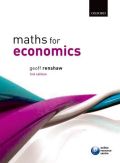
Maths for Economics provides a solid foundation in mathematical principles and methods used in economics, beginning by revisiting basic skills in arithmetic, algebra and equation solving and slowly building to more advanced topics, using a carefully calculated learning gradient. Many years of teaching led Geoff Renshaw to develop Maths for Economics as a resource which builds your self-confidence in maths by using a gradual learning gradient and constantly reinforcing learning with examples and exercises. Some students embarking on this module feel that they have lost their confidence in maths, or perhaps never hadany in the first place. The author has designed the book so that whether you have a maths A level, GCSE, or perhaps feel that you need to goback over the very basics, knowledge is built up in small steps, not big jumps. Once you are confident that you have firmly grasped the foundations, this book will help you to make the progression beyond the mechanical exercises and into the development of a maths tool-kit for the analysis of economicand business problems. This is a skill which will prove valuable for your degree and for your future employers.The online resource centre contains the following resources:For Students:Ask the author forumExcel tutorialMaple tutorialFurther exercisesAnswers to further questionsExpanded solutions to progress exercisesFor Lecturers (password protected):Test exercisesGraphs from the bookAnswers to test exercisesPowerPoint presentationsInstructor manual INDICE: Part I: Foundations Arithmetic Algebra Linear Equations Quadratic Equations Some further equations and techniques Part II: Optimisation with oneindependent variable Derivatives and differentiation Derivatives in action Economic applications of functions and derivatives Elasticity Part III: Mathematics of finance and growth Compound growth and present discounted value The exponential function and logarithms Continuous growth and the natural exponentialfunction Derivatives of exponential and logarithmic functions and their applications Part IV: Optimisation with two or more independent variables Functionsof two or more independent variables Maximum and minimum values, the total differential and applications Constrained maximum and minimum values Returns to scale and homogeneous functions; partial elasticities; logarithmic scales; growth accounting Part V: Some further topics Integration Matrix Algebra Difference and differential equations
- ISBN: 978-0-19-960212-4
- Editorial: Oxford University
- Encuadernacion: Rústica
- Páginas: 704
- Fecha Publicación: 01/12/2011
- Nº Volúmenes: 1
- Idioma: Inglés
